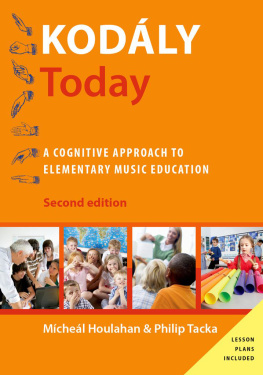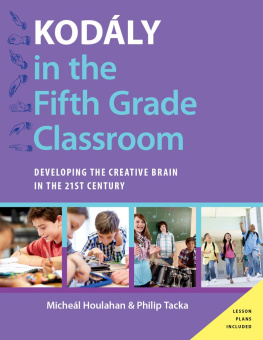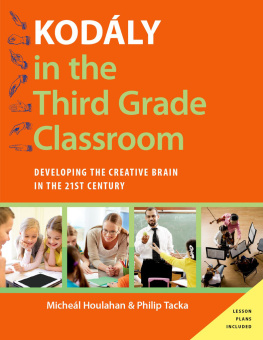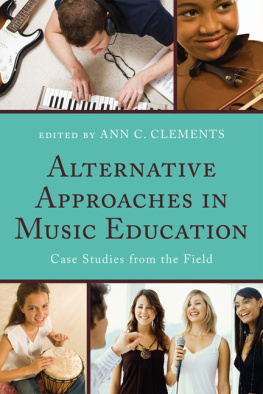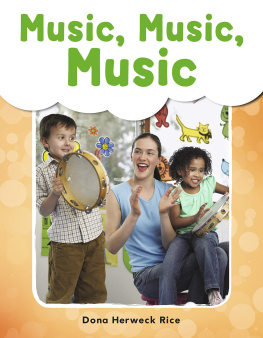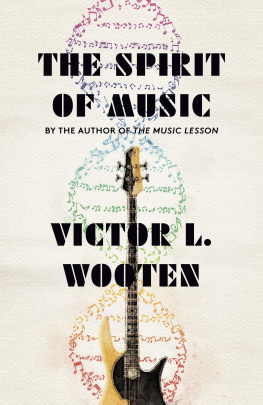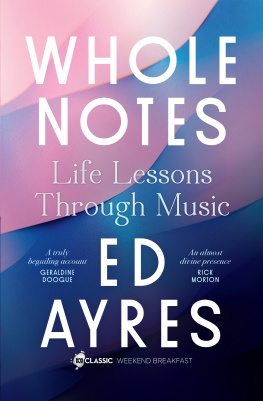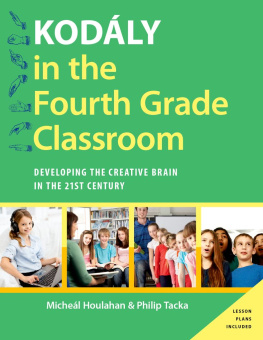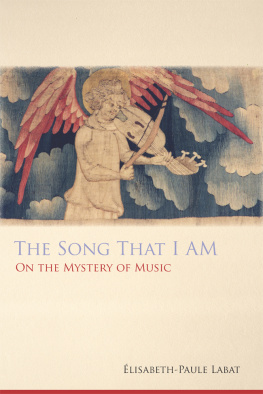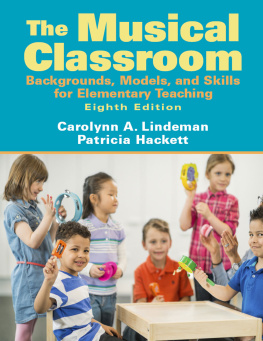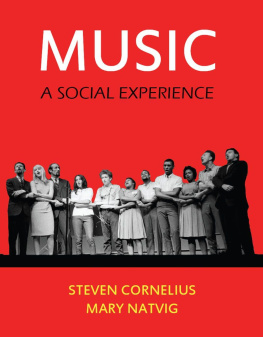Kodly Today
Kodly Today Handbook Series
Michel Houlahan and Philip Tacka
Kodly Today: A Cognitive Approach to Elementary Music Education, second edition
Kodly in the Kindergarten Classroom: Developing the Creative Brain in the 21st Century
Kodly in the First Grade Classroom: Developing the Creative Brain in the 21st Century
Kodly in the Second Grade Classroom: Developing the Creative Brain in the 21st Century
Kodly in the Third Grade Classroom: Developing the Creative Brain in the 21st Century
Kodly in the Fourth Grade Classroom: Developing the Creative Brain in the 21st Century
Kodly in the Fifth Grade Classroom: Developing the Creative Brain in the 21st Century

Oxford University Press is a department of the University of Oxford. It furthers the Universitys objective of excellence in research, scholarship, and education by publishing worldwide.
OxfordNew York
AucklandCape TownDar es SalaamHong KongKarachi
Kuala LumpurMadridMelbourneMexico CityNairobi
New DelhiShanghaiTaipeiToronto
With offices in
ArgentinaAustriaBrazilChileCzech RepublicFranceGreece
GuatemalaHungaryItalyJapanPolandPortugalSingapore
South KoreaSwitzerlandThailandTurkeyUkraineVietnam
Oxford is a registered trademark of Oxford University Press in the UK and certain other countries.
Published in the United States of America by
Oxford University Press
198 Madison Avenue, New York, NY 10016
Oxford University Press 2015
All rights reserved. No part of this publication may be reproduced, stored in a retrieval system, or transmitted, in any form or by any means, without the prior permission in writing of Oxford University Press, or as expressly permitted by law, by license, or under terms agreed with the appropriate reproduction rights organization. Inquiries concerning reproduction outside the scope of the above should be sent to the Rights Department, Oxford University Press, at the address above.
You must not circulate this work in any other form and you must impose this same condition on any acquirer.
Library of Congress Cataloging-in-Publication Data
Houlahan, Michel, author.
Kodly today: a cognitive approach to elementary music education/by Michel Houlahan and Philip Tacka.2nd edition.
pages cm
Includes bibliographical references and index.
ISBN 9780190255015 (hardback)ISBN 9780190235772 (paperback)eISBN 9780190236144
1.School musicInstruction and study.2.Cognitive learning.3.Kodly, Zoltn, 1882-1967.
I.Tacka, Philip, author.II.Title.
MT1.H838 2015
372.87dc23
2014032953
We are the music-makers,
And we are the dreamers of dreams,
Wandering by lone sea-breakers,
And sitting by desolate streams;
World-losers and world-forsakers,
On whom the pale moon gleams:
Yet we are the movers and shakers
Of the world for ever, it seems.
Ode, by Arthur OShaughnessy
[] eratque tam turpe Musicam nescire quam litteras
from De Musica, by Isidoris Hispalensis
Legyen A Zene Mindenki [Music should belong to everyone]
Zoltn Kodly
Contents
A debt of gratitude is due to the many individuals who inspired, encouraged, and helped us with our research for this publication. We were both fortunate enough to study at the Franz Liszt Academy/Kodly Pedagogical Institute in Hungary and at the Kodly Center of America with world-renowned Kodly experts, many of whom were his pupils and colleagues, who shared their knowledge with us over many years. Among them were Lszl Esze, Peter Erdei, Katalin Forrai, Lilla Gbor, Erzsbet Hegyi, Ildiko Herboly-Kocsr, Mihly Ittzs, Katalin Kiss, Klra Kokas, Katalin Komlos, Klra Nemes, Helga Szabo, and Eva Vendrai. We are indebted to Lauren Bain, elementary music specialist in the Northeast School District of San Antonio, Texas, for her willingness to pilot lesson plans and document her teaching through videos. We also thank Rebecca Morgan of the Montessori School of San Antonio, Texas, for her willingness to field-test materials and lessons. This was a tremendous labor of love.
Special thanks are due to these individuals for critically reading portions of the manuscript and for their insightful suggestions regarding this approach to instruction and learning: Lauren Bain; Nick Holland, lower school music teacher at St. Pauls School in Baltimore, Maryland; Georgia Katsourides, music specialist in the Lancaster City School District, Pennsylvania; Vivian Ferchill, retired music specialist from Round Rock, Texas; Meredith Riggs, music specialist in the Austin Independent School District, Austin, Texas. We would also like to thank Holly Kofod and Lisa Roebuck for their comments, which helped us bring this book to completion. Special thanks go to Nick Holland for his contributions to the lesson plans and for providing videos that incorporate the use of smart board technology.
We are grateful to Patty Moreno, instructional coordinator of fine arts for the Austin Independent School District, Texas, and director of the Kodly Certification Program at Texas State University, San Marcos, Texas, for her support and continued encouragement of this project. For more than a decade she has facilitated our research and field testing with teachers in the Austin Independent School District as well as the Houston Independent School District and the Sicorro Independent School District in El Paso, Texas.
Many of our students in Kodly Certification Programs at Texas State University, Belmont University in Nashville, Tennessee, and the Eastman School of Music in Rochester, New York, have helped us shape the approach to instruction and learning that is presented herein. Our many years of work with our students have not only contributed to the information we present but also served as a continuing source of inspiration with the pedagogical processes we have shaped.
We would like to thank our students at Millersville University of Pennsylvania for helping us with technical and practical matters related to the manuscript. Special thanks are owed to Jamie Duca, Emma Noble, Lillian Noble, Honorah Harvey, Andrea Kurnat, and Demetrius Archer for their hands-on assistance.
This book would not be as complete as it is in terms of pedagogy and educational content were it not for readings and comments from Blaithn Burns, math teacher and Kodly instructor at the Blue Coat School in England. She provided invaluable assistance in the initial design of the book and field-tested many teaching strategies. Richard Schellhas deserves thanks for his personal patience and understanding as well as words of encouragement and advice throughout the writing of this manuscript.
Research for this publication was supported by a grant from Millersville University, and the State System for Higher Education in Pennsylvania. The universitys library assistance; technical, administrative, and financial support; and overall encouragement for this project have allowed us to bring this volume to completion. We would like to express our gratitude to Gabriela Montoya-Stier and Faith Knowles for their permission to include songs from their collections El Patio de Mi Casa: Traditional Rhymes, Games and Folk Songs from Mexico and Vamos a Cantar.
We wish to thank Suzanne Ryan, Editor-in-Chief of Humanities and Executive Editor of Music at Oxford University Press for her encouragement and critical guidance. We thank Lisbeth Redfield, assistant editor at Oxford University Press, and Molly Morrison of Newgen, who oversaw editing and production. Very special thanks are due our editor, Thomas Finnegan, for his impeccable scrutiny and thoughtful editorial assistance with our manuscript.

